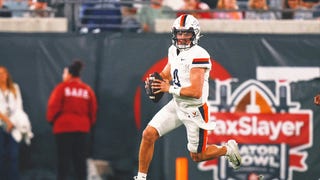The stars are aligning. Phil Mickelson won at Pebble Beach, and Rory McIlroy reached No. 1 in the world. And, of course, there was Tiger Woods in Sunday red, a winner again at last on the PGA Tour.
It's Masters time.
But even as the azaleas start to bloom, a thorny issue has returned — the all-male membership at Augusta National Golf Club — thanks to another achievement that took place far away from the fairways and greens. Virginia Rometty officially took over Jan. 1 as CEO of IBM, the first woman to be chief executive in the 100-year history of Big Blue.
IBM is a longtime corporate sponsor of the Masters, and its last four CEOs have been invited to be members.
Next in line, though, is a woman.
For Martha Burk, who led an unsuccessful campaign 10 years ago for Augusta to admit a female member, the solution is simple.
"What IBM needs to do is draw a line in the sand — 'We're either going to pull our sponsorship and membership and any ancillary activities we support with the tournament, or the club is going to have to honor our CEO the way they have in the past,'" Burke said in a telephone interview.
"There's no papering over it," she said. "They just need to step up and do the right thing."
Club officials have declined comment, citing its policy that membership issues are private. At least there has been no mention of a "bayonet," the term used by former chairman Hootie Johnson that ignited this debate in the summer of 2002.
IBM has not returned phone calls seeking comment.
It would seem that something has to give — the club's recent history asking IBM chief executives to become members, or its history of never having a female member since it opened in 1933.
To be clear, Augusta allows women to play as guests during the eight months it is open (October to May).
And the exclusivity of the club is limited in practice. Johnson, during a 2002 interview with The Associated Press, said Augusta National holds four parties a year in which only the members are allowed.
Still, these aren't your ordinary businessmen. The members include Warren Buffett and Bill Gates, CEOs from major insurance companies, financial firms and media companies, including Brian Roberts of Comcast, which owns Golf Channel.
None are women.
What has become clear is that questions about the way Augusta National does business — and whom it invites — are sure to get as much attention as the return of Woods or the emergence of McIlroy.
Anticipation has shifted from who's going to win the green jacket to whether a woman will finally wear a green jacket.
One difference this time around is that Burk can put a face on the controversy, even though Rometty has not said whether she is interested in becoming a member. In fact, Rometty is said to be play golf sparingly. She is more passionate about scuba diving.
Fortune magazine listed her at No. 7 last year in its annual ranking of the "50 Most Powerful Women in Business." It was the seventh consecutive year she has been on the list.
Augusta never talks about its members, although they are seen in green jackets during the tournament. That's how it was discovered that former Pittsburgh Steelers receiver Lynn Swann was invited to join.
Johnson, and successor Billy Payne, made it clear that there is no timetable for inviting a woman to join, and if history is any indication, pressure from Burk or the media is not going to change that.
Burk worries that Rometty might feel pressure to avoid the all-male club, and says that's a much the fault of IBM as Augusta National.
"It does put IBM in a tough spot, but it's all their own making," Burk said Friday morning on CNN. "They have had nine years to help this club come into the 21st century. They've done nothing about it. Now, they're both in a bind.
"I wouldn't put this on the CEO to do," she said, referring to Rometty. "It is the board of directors' responsibility. Samuel Palmissano, who is a member of the club, has a great responsibility here as chairman of IBM. And they need to just step up and do the right thing and get this over with."
Rometty replaced Palmissano as CEO while he stayed on as chairman.
When Burk was leading her fight to open Augusta to women, the Masters did away with television sponsors for two years to keep them out of the fray. When corporate sponsorship returned for the 2005 Masters, only IBM came back. Coca-Cola and Citigroup did not.
Burk doesn't consider her campaign a complete failure, even though it fizzled at a protest during the third round of the 2003 tournament in a parking lot down the street from the club. Without that protest, "this wouldn't be on the table now."
Just like that, she is back in the news.
After CNN, she was to tape a segment for "NBC Nightly News" later Friday. She might get a phone call once a month on the Augusta membership, and now can't keep track of who's calling.
Augusta won the first battle. This time, Burk believes there potentially are two enemies of equal rights for women.
"The company has a huge responsibility here not to undermine its first female CEO," she said on CNN. "If they accept anything less than full membership — or resign their sponsorship, which is another option — they're going to undermine their new CEO. And they'll be making a statement that they don't consider her an equal to her predecessors."








































